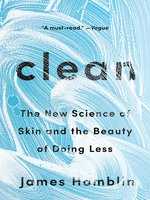One of Smithsonian's Ten Best Science Books of 2020
“A searching and vital explication of germ theory, social norms, and what the modern era is really doing to our bodies and our psyches.” —Vanity Fair
A preventative medicine physician and staff writer for The Atlantic explains the surprising and unintended effects of our hygiene practices in this informative and entertaining introduction to the new science of skin microbes and probiotics.
Keeping skin healthy is a booming industry, and yet it seems like almost no one agrees on what actually works. Confusing messages from health authorities and ineffective treatments have left many people desperate for reliable solutions. An enormous alternative industry is filling the void, selling products that are often of questionable safety and totally unknown effectiveness.
In Clean, doctor and journalist James Hamblin explores how we got here, examining the science and culture of how we care for our skin today. He talks to dermatologists, microbiologists, allergists, immunologists, aestheticians, bar-soap enthusiasts, venture capitalists, Amish people, theologians, and straight-up scam artists, trying to figure out what it really means to be clean. He even experiments with giving up showers entirely, and discovers that he is not alone.
Along the way, he realizes that most of our standards of cleanliness are less related to health than most people think. A major part of the picture has been missing: a little-known ecosystem known as the skin microbiome—the trillions of microbes that live on our skin and in our pores. These microbes are not dangerous; they’re more like an outer layer of skin that no one knew we had, and they influence everything from acne, eczema, and dry skin, to how we smell. The new goal of skin care will be to cultivate a healthy biome—and to embrace the meaning of “clean” in the natural sense. This can mean doing much less, saving time, money, energy, water, and plastic bottles in the process.
Lucid, accessible, and deeply researched, Clean explores the ongoing, radical change in the way we think about our skin, introducing readers to the emerging science that will be at the forefront of health and wellness conversations in coming years.
One of Smithsonian's Ten Best Science Books of 2020
“A searching and vital explication of germ theory, social norms, and what the modern era is really doing to our bodies and our psyches.” —Vanity Fair
A preventative medicine physician and staff writer for The Atlantic explains the surprising and unintended effects of our hygiene practices in this informative and entertaining introduction to the new science of skin microbes and probiotics.
Keeping skin healthy is a booming industry, and yet it seems like almost no one agrees on what actually works. Confusing messages from health authorities and ineffective treatments have left many people desperate for reliable solutions. An enormous alternative industry is filling the void, selling products that are often of questionable safety and totally unknown effectiveness.
In Clean, doctor and journalist James Hamblin explores how we got here, examining the science and culture of how we care for our skin today. He talks to dermatologists, microbiologists, allergists, immunologists, aestheticians, bar-soap enthusiasts, venture capitalists, Amish people, theologians, and straight-up scam artists, trying to figure out what it really means to be clean. He even experiments with giving up showers entirely, and discovers that he is not alone.
Along the way, he realizes that most of our standards of cleanliness are less related to health than most people think. A major part of the picture has been missing: a little-known ecosystem known as the skin microbiome—the trillions of microbes that live on our skin and in our pores. These microbes are not dangerous; they’re more like an outer layer of skin that no one knew we had, and they influence everything from acne, eczema, and dry skin, to how we smell. The new goal of skin care will be to cultivate a healthy biome—and to embrace the meaning of “clean” in the natural sense. This can mean doing much less, saving time, money, energy, water, and plastic bottles in the process.
Lucid, accessible, and deeply researched, Clean explores the ongoing, radical change in the way we think about our skin, introducing readers to the emerging science that will be at the forefront of health and wellness conversations in coming years.







